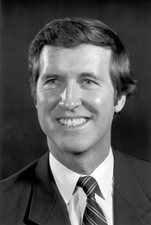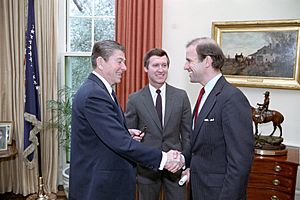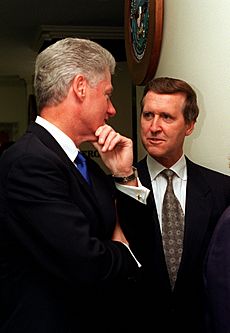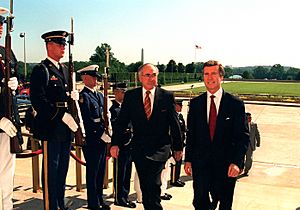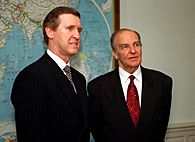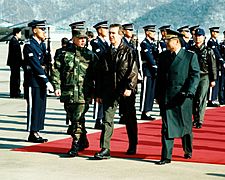William Cohen facts for kids
Quick facts for kids
William Cohen
|
|
|---|---|
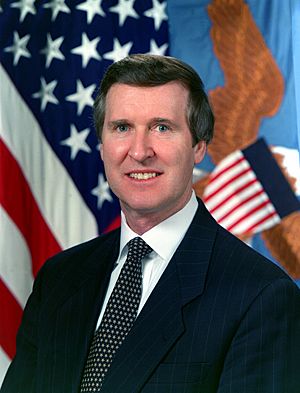
Official portrait, 1997
|
|
| 20th United States Secretary of Defense | |
| In office January 24, 1997 – January 20, 2001 |
|
| President | Bill Clinton |
| Deputy | John Hamre Rudy de Leon |
| Preceded by | William J. Perry |
| Succeeded by | Donald Rumsfeld |
| United States Senator from Maine |
|
| In office January 3, 1979 – January 3, 1997 |
|
| Preceded by | William Hathaway |
| Succeeded by | Susan Collins |
| Chair of the Senate Aging Committee | |
| In office January 4, 1995 – January 3, 1997 |
|
| Preceded by | David Pryor |
| Succeeded by | Chuck Grassley |
| Chair of the Senate Indian Affairs Committee | |
| In office January 5, 1981 – January 3, 1983 |
|
| Preceded by | John Melcher |
| Succeeded by | Mark Andrews |
| Member of the U.S. House of Representatives from Maine's 2nd district |
|
| In office January 3, 1973 – January 3, 1979 |
|
| Preceded by | William Hathaway |
| Succeeded by | Olympia Snowe |
| Mayor of Bangor, Maine | |
| In office 1971–1972 |
|
| Member of the Bangor City Council | |
| In office 1969–1972 |
|
| Personal details | |
| Born |
William Sebastian Cohen
August 28, 1940 Bangor, Maine, U.S. |
| Political party | Republican |
| Spouses |
Diana Dunn
(div. 1987) |
| Children | 2 |
| Education | Bowdoin College (BA) Boston University (LLB) |
William Sebastian Cohen (born August 28, 1940) is an American lawyer, author, and politician from Maine. He is a member of the Republican Party. Cohen served in the United States House of Representatives from 1973 to 1979. He then served in the United States Senate from 1979 to 1997. Later, he became the United States Secretary of Defense from 1997 to 2001. He held this important role under Democratic President Bill Clinton.
People described Cohen as a "moderate Republican" who often found ways to work with others. He had good relationships with President Clinton and his national security team. However, he sometimes disagreed with Secretary of State Madeleine Albright.
Contents
Early Life and Education
William Cohen was born in Bangor, Maine. His mother, Clara, had Irish roots. His father, Reuben, was the son of a Russian Jewish immigrant. They owned a bread company in Bangor.
Cohen went to Bangor High School and graduated in 1958. He then attended Bowdoin College, where he earned a degree in Latin in 1962. While at Bowdoin, he was part of the Psi Upsilon fraternity.
Cohen was a talented basketball player in high school and college. He was named to the Maine all-state teams. He was also inducted into the New England All-Star Hall of Fame at Bowdoin. After college, he studied law at Boston University School of Law. He graduated with a law degree in 1965.
Early Career in Law and Politics
After law school, Cohen worked as an assistant county attorney in Penobscot County from 1968 to 1970. He also taught at Husson College and the University of Maine.
Cohen was active in the legal community. He was the vice president of the Maine Trial Lawyers Association from 1970 to 1972. He also served on the Bangor School Board.
In local politics, Cohen was elected to the Bangor City Council in 1969. He served there until 1972. He also held the position of Mayor of Bangor from 1971 to 1972.
Serving in Congress
In 1972, Cohen won a seat in the United States House of Representatives. He represented Maine's 2nd congressional district. During his first term, he joined the House Judiciary Committee. This committee was involved in the 1974 hearings about President Richard Nixon. Cohen was one of the first Republicans on the committee to support the idea of impeaching Nixon. Because of his work, Time magazine named him one of "America's 200 Future Leaders."
After serving three terms in the House, Cohen was elected to the United States Senate in 1978. He won re-election in 1984 and 1990. He served a total of 18 years in the Senate, from 1979 to 1997. Cohen became known as a moderate Republican. He was good at finding compromises between different groups.
In 1994, Cohen looked into how the government bought computer technology. His report, Computer Chaos, showed that billions of dollars were wasted. He decided not to run for another Senate term in 1996. Susan Collins, who had worked for Cohen, was elected to take his place.
While in the Senate, Cohen served on important committees. These included the Senate Armed Services Committee and the Governmental Affairs Committee. He also served on the Senate Intelligence Committee. He helped write several laws about defense. These laws included the Competition in Contracting Act and the Goldwater–Nichols Act. He also supported making Martin Luther King Jr. Day a federal holiday.
Secretary of Defense
On December 5, 1996, President Bill Clinton chose William Cohen to be the United States Secretary of Defense. Clinton said Cohen was the "right person" for the job. As Secretary of Defense, Cohen helped guide U.S. military actions. These included operations in Iraq and Kosovo. For example, Operation Desert Fox in Iraq and Operation Allied Force in Kosovo happened during his time.
Confirmation and Early Days
During his confirmation hearings, Cohen shared his views. He said he might sometimes disagree with President Clinton on national security. He also said that U.S. troops should leave Bosnia by mid-1998. Cohen promised to resist further budget cuts for the military. He wanted to keep spending on advanced weapons.
The Senate approved Cohen unanimously. He became the 20th Secretary of Defense on January 24, 1997. His schedule at the The Pentagon was very busy. He had daily intelligence briefings and met with top military leaders. He also met with foreign leaders and White House officials.
Defense Budget and Planning
One of Cohen's first big tasks was to present the defense budget for 1998 to Congress. He asked for $250.7 billion. Cohen focused on three main priorities:
- People: Making sure military members were well-trained and supported. This included good pay and family programs.
- Readiness: Keeping forces ready for action through training and maintenance.
- Modernization: Developing and improving weapons and systems. This was to ensure U.S. forces remained strong.
Cohen also worked on the Quadrennial Defense Review (QDR). This review looked at U.S. security challenges for the next decade. The QDR kept the strategy of being ready for "two regional wars." Cohen suggested reducing the number of active duty service members and reserve forces. He also recommended closing more military bases. The goal was to save money to buy new equipment without greatly increasing the budget.
Global Relations and Challenges
Cohen supported the expansion of NATO. He also worked on NATO's relationship with Russia. In 1997, President Clinton and Russian President Boris Yeltsin agreed on a new council. This council would allow Russia to discuss security issues with NATO nations. This agreement helped pave the way for countries like Poland, Hungary, and the Czech Republic to join NATO.
The U.S. missile defense system was also a key topic. Clinton and Yeltsin agreed on how to interpret the 1972 Anti-Ballistic Missile Treaty. This allowed the U.S. to develop a limited missile defense system. They also made progress on arms control, aiming for further cuts in nuclear weapons.
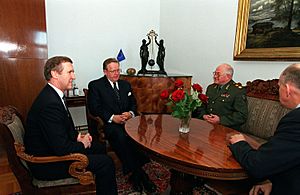
Cohen was concerned about peacekeeping missions, like the one in Bosnia. Other ongoing security problems included tensions with Iraq, Libya, and North Korea. The Arab–Israeli conflict also remained a concern.
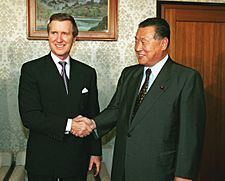
A new challenge was the growth of large defense companies. Many smaller companies merged into a few big ones. Cohen worried this could reduce competition and increase costs for the Department of Defense.
Recent Years and Activities
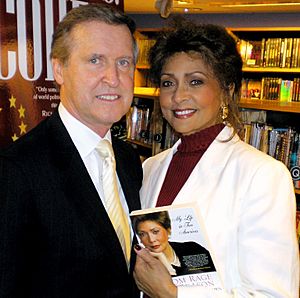
After leaving the Pentagon in 2001, Cohen started The Cohen Group. This is a business consulting firm. In 2002, he received the Woodrow Wilson Award for Public Service. This award recognized his work in public service.
Cohen has written several books. These include mystery novels, poetry, and a book about the Iran–Contra affair. He is also a Chairman Emeritus of the US–Taiwan Business Council.
In 2006, Cohen released his novel, Dragon Fire. The story is about a secretary of defense dealing with a nuclear threat. In December 2006, he published a memoir with his wife, Janet Langhart. It is called Love in Black and White. In interviews, he has spoken about the importance of national service.
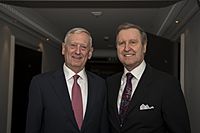
BBC News hired Cohen as a world affairs analyst in 2016. He appears on BBC World News America and other shows.
Cohen also co-chaired a "Genocide Prevention Task Force" with Madeleine Albright. He is an advisory board member for the Partnership for a Secure America. He is also a member of the ReFormers Caucus of Issue One.
During the 2016 and 2020 presidential elections, Cohen supported the Democratic candidates. However, in 2020, he also endorsed Republican Senator Susan Collins for re-election.
In January 2021, Cohen and all other living former secretaries of defense wrote an article. They advised President Trump not to involve the military in election results. In 2022, Cohen helped create a group of U.S. leaders. This group aims to improve relations between the U.S. and China.
Personal Life
William Cohen has two sons, Kevin and Christopher, from his first marriage. On February 14, 1996, he married Janet Langhart. She is a former model and television personality. She was known as the "First Lady of the Pentagon" during his time as Secretary of Defense.
Cohen was the best man at John McCain's second wedding. McCain later became his colleague in the Senate. Cohen is a Unitarian Universalist.
Attack at Holocaust Museum
On June 10, 2009, Cohen was at the U.S. Holocaust Museum. He was waiting for his wife, Janet Langhart. She was performing in her play, Anne and Emmett. While he waited, a man attacked the museum. The attacker shot and killed a security guard, Stephen Tyrone Johns. Other guards then wounded the attacker. Cohen and Langhart were not hurt. They later spoke on CNN about what they saw. The attacker was James W. von Brunn, an 88-year-old white supremacist. He was charged with murder and hate crimes.
Honors
 Grand Cordon of the Order of the Rising Sun, Japan (2018)
Grand Cordon of the Order of the Rising Sun, Japan (2018)
Recent Publications
- July 7, 2009, "On Common Ground", Forbes magazine
- June 8, 2009, "Smart Power Is Soft Power", Politico
- June 3, 2009, "Nuclear Cooperation with U.A.E. in Our Interest", The Hill
- May 28, 2009, "Obama's chance to cement ties with India", Financial Times
- May 28, 2009, "No Time to Cut Missile Defense", The Washington Times
- April 23, 2009, "The World Depends on U.S.-China Cooperation", The Wall Street Journal
- September 30, 2008, "The India Nuclear Deal: The Merits", Forbes magazine
- December 30, 2007, "Changing Our Direction", www.nationalinterest.org
- August 12, 2007, "What Is This Man Thinking?", The Washington Post
- February 5, 2007, "Perfect Partners", Asian Wall Street Journal
- July 17, 2007, "Commentary: North Korea's Declaration of Independence", CNN
See also
 In Spanish: William Cohen para niños
In Spanish: William Cohen para niños
- List of United States political appointments that crossed party lines
- List of Jewish United States Cabinet members
- List of mayors of Bangor, Maine
 | Precious Adams |
 | Lauren Anderson |
 | Janet Collins |


